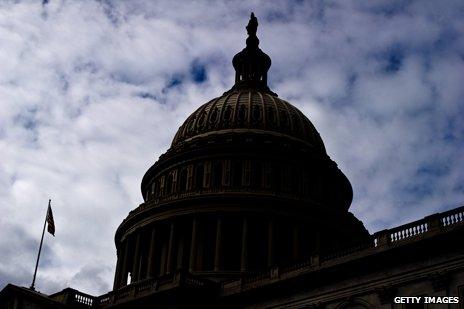The gathering storm?
- Published
- comments

When the government of the world's largest economy faces shutdown in just a few hours, and the imminent collapse seems likely of a eurozone government struggling under crippling debts, there is very little of any profundity that can be said.
Except to note that the overnight falls in Asian shares of between 1.5% and 2%, and a drop in UK shares of less than 1% on average, seem a relatively mild reaction, in the circumstances.
And to point out that for all the absence of any big economic or financial shocks for the best part of two years, substantial accidents can still happen, in a global economy that remains structurally flawed in a serious and substantive way.
The fragility of the Italian administration is a reminder of the intimate and poisonous connection between big Italian banks and two trillion euros of Italian government debts. Undercapitalised banks, vital to credit creation, have lent an unhealthy amount to the state, and the most benign route to strengthening banks and state - a revival of growth which would generate profits for banks and tax revenues for government - is pimpernel-like in its elusiveness.
Or to put it another way, the eurozone is not fixed, for all the natural human instinct to assume it is OK to go back in the water simply because no one has been eaten by a shark recently (see page 2 of this morning's Deloitte survey, external of chief financial officers for evidence of how no news is good news for the economy's decision makers).
Even the relatively modest attempt at burden sharing within the eurozone, a banking union that would initiate an "all-for-one" approach to reconstructing failing banks, is nowhere in sight.
As for the US, it is a recovering economy whose momentum is regularly and periodically hobbled by dysfunctional government.
The worst that could happen is, of course, not that 800,000 federal government workers could be put on unpaid leave, with disruption to all manner of non-essential public services, from passport renewals to park maintenance.
It is extrapolation to phase two of the budget negotiations, that there will be no agreement on raising the $16.7tn ceiling on the indebtedness of the government, which is much more serious for the rest of the world.
Because at that point the unthinkable would actually happen - default on trillions of dollars of US public sector debts, meaningful losses for pretty much every bank, central bank and pension fund on the planet, and a worldwide rise in interest rates for a global economy still wholly dependent on cheap money (just to remind you - the yield or interest rate on US Treasury Bonds is the benchmark for pretty much all interest rates, and when the bond prices fall, yields or rates rise).
Of course the worst probably won't happen. Congress will probably swerve the car a few seconds before it plummets over the cliff.
But this game of chicken doesn't seem altogether the best way to steward an economy that matters to us all.